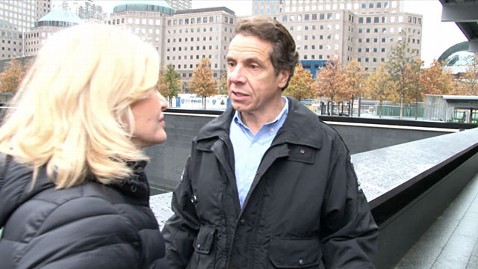New York Governor Andrew Cuomo Worries About More Storms Like Sandy

Gov. Andrew Cuomo with Diane Sawyer. Image: ABC News.
ABC News' Eric Noll reports:
New York Gov. Andrew Cuomo described the scene in Lower Manhattan and at the World Trade Center Memorial Monday night as "frightening," but said today that things were looking much better and that the city would quickly come back from Hurricane Sandy.
"It was all dark because [Con Edison] had turned off the power. And the water. The Hudson River was just a few hundred yards to the right from us. It had come over the banks. … And was filling this site [at the World Trade Center Memorial] at such a rate and from every direction," he said today. "You were just wondering when it was going to stop. … We could not have taken much more of the flow that we were getting last night."
Cuomo said officials feared for the memorial, its underground museum and the city's other underground infrastructure such as its subway tunnels. He said that at one point Monday night, they even wondered whether the rushing waters would collapse the entire World Trade Center site.
"The way New York was designed, we're not in a part of the country that deals with floods or [is] designed to deal with floods," he said. "We have a lot of infrastructure under the ground that gets filled up. The subway tunnels have all flooded. Some of the subway stations, the water is up to the ceiling."
Cuomo said officials did not know when the power would be completely restored. He said the subway tunnels would have to be pumped first because much of Con Edison's equipment was located there. He estimated that would take a couple of days.
The New York governor told ABC News that he agreed with former Vice President Al Gore, who said in a blog post earlier today that Hurricane Sandy was a symptom of a larger climate crisis
"I believe he's right," Cuomo said. "I said kiddingly the other day, 'We have a 100-year flood every two years now.' These situations never happened or if they happened, they were never going to happen again. … I think at this point it's undeniable that we have a higher frequency of these extreme weather situations, and we're going to have to deal with it."